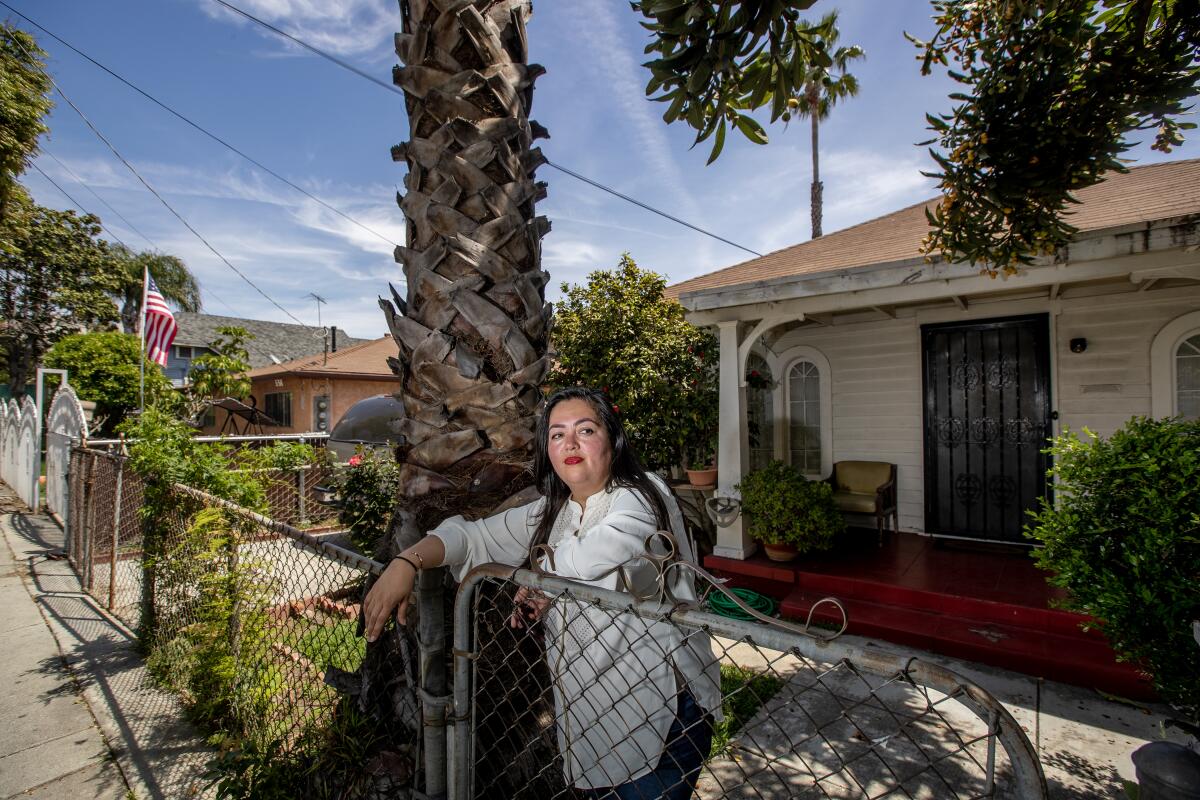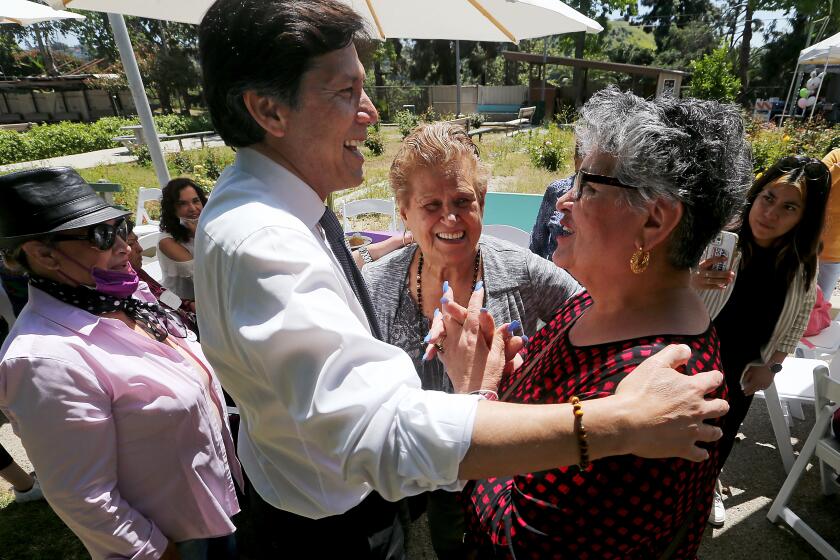Column: Why Wendy Carrillo is a natural alternative to Kevin de León on L.A.’s City Council

- Share via
In her bright red blazer, Wendy Carrillo stood out in the tattooed crowd of ex-gang members at Homeboy Industries, a nonprofit that runs gang rehabilitation and reentry programs. But as Carrillo, a state assemblywoman whose district includes East Los Angeles, took the microphone, she was in her element. “I’m so proud to represent you,” she said.
Carrillo was at Homeboy’s morning meeting early this month to talk about her bill, the HOME Act, which aims to end post-incarceration punishment for immigrants. “We will ensure that there is only one system of justice in the state of California that treats all of us the same, regardless of where we were born,” she promised.
“That’s right!” some men exclaimed. Other people nodded and applauded.
Carrillo is running to replace Kevin de León on the Los Angeles City Council. Her bill would close loopholes in the 2017 California Values Act, the state sanctuary law written by De León, which stops state and local law enforcement agencies from assisting federal immigration authorities in most cases.
She’s a natural alternative to De León, who, before he became a pariah after being caught on a racially incendiary audio recording, was respected by many people as one of Trump’s biggest nemeses on immigration.
Carrillo’s record on immigrant rights — also De León’s defining issue — may soon eclipse his. Her HOME Act passed the Assembly at the end of May. It’s now in the Senate. If it passes, it would stop the California Department of Corrections and Rehabilitation, largely carved out of De León’s sanctuary law, from helping Immigration and Customs Enforcement deport people who’ve earned release under new state criminal justice reforms.
Another Carrillo bill, the VISION Act, which failed by three votes in the state Senate last year, would have closed more loopholes in De León’s law.
Over chilaquiles at Homegirl Café, Carrillo explained her mixed feelings about De León’s sanctuary law, which doesn’t cover every Californian who is vulnerable to deportation. His concessions to law enforcement allowed the bill to pass, but the compromise left many unprotected from ICE’s brutal enforcement efforts. “It created dual systems of justice throughout the state,” she said. “Folks who have been paroled by the parole board are still being picked up by ICE in a private van.”
Carrillo, who was once undocumented herself, wants to make California a truly sanctuary state. Whether she has the negotiating skills to do so remains to be seen. The pragmatic line on a culture-war issue is difficult to find. But some immigrant rights defenders believe De León yielded too much too fast to the tough-on-crime lobby. Carrillo believes she can persuade moderate colleagues to come around.
Although his policies have helped people of all backgrounds, he views himself as an embattled leader who represents, above all, Latinos.
She didn’t trash De León in our conversations, although she did call on him and other council members to resign in October after the racist audio scandal broke. She believes she can do better than him. Not only on state sanctuary policies but also on many of the local challenges in District 14, from basic street repairs to homelessness. Carrillo told me she decided to run for the City Council when the controversy over De León’s refusal to resign complicated constituents’ access to services. She also heard from residents upset by his mayoral run last year, which they saw as him seeking a higher office at their expense.
Carrillo’s family immigrated to L.A. from El Salvador when she was 5, and she recalls going to Mass at Dolores Mission, where Father Gregory Boyle, the founder of Homeboy Industries, served. His faith in second chances and in the value of every human being, regardless of their flaws, resonated with her. In college, she made a short film about Homeboy Industries. Then she started a Power 106 radio show, “Knowledge Is Power,” which regularly featured Father Boyle.
In her more than five years in the Assembly, she has secured millions of dollars in state partnership support for Homeboy Industries as well as for other programs that provide youth jobs and workforce training, affordable housing and community clinics. She authored a bill that created a reparations fund for the mostly Black and Latina women who were forcibly sterilized in California, and later secured more funds to help locate many victims who did not apply.
While many of her battles are in Sacramento, she’s well known in the streets of Los Angeles. I asked Carrillo to meet me at Homeboy Industries, which has long helped men from the Eastside get back on track after making mistakes. Given her faith in second chances, did she agree with city leaders’ rejection of De León’s apologies? Did they miss an opportunity to show empathy in action?
“Could there have been a different response? Yeah,” she said. But she also understands the pain that makes forgiveness difficult. “I admire the strength and resiliency of the Black community. Whatever internal fights they have — and all communities have them — that’s not the way it appears to the outside world. There’s unity in a goal. There’s unity in wanting representation.”
Latino leaders often lack that unity. Few publicly defended De León’s decision to remain on the council. But his leadership style, which promoted Latino tribalism in private, struck many allies as abrasive.
Carrillo isn’t interested in pitting Latinos against other groups. “I think it’s important that we are grounded in our history and who we are and where we come from, but … you have to be a leader for everyone,” she said.
Along with her belief that no one is disposable or irredeemable, she rejects the tribalism of the social media age, with its hierarchical and divisive views of people. Because of her consistency on equality, she could beat De León.
More to Read
A cure for the common opinion
Get thought-provoking perspectives with our weekly newsletter.
You may occasionally receive promotional content from the Los Angeles Times.













